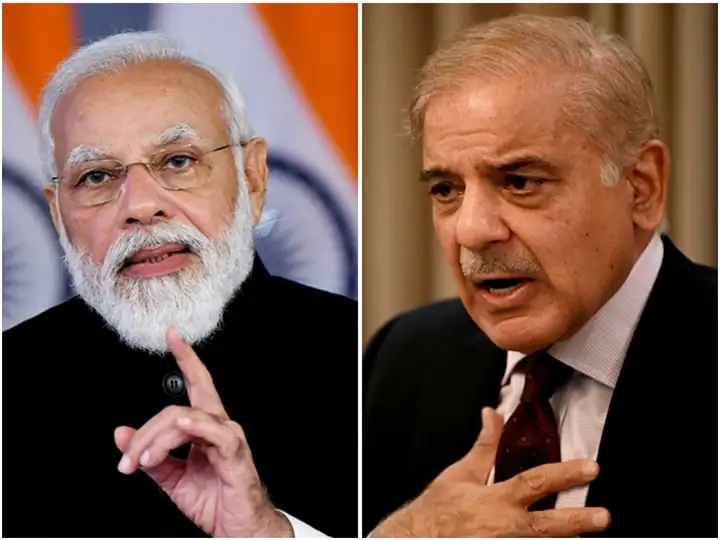ISLAMABAD
Shehbaz Sharif was congratulated by Indian Prime Minister Narendra Modi on taking on the role of prime minister on Tuesday; yet, his brief post on X seemed to have a “quiet” message for Pakistan.

As his second term as prime minister draws to a close, Modi has already congratulated Shehbaz Sharif in April 2022 and Imran Khan in August 2018.
In fact, when he was chosen as the nation’s chief executive, he had a conversation with Imran, the then-prime minister. Along with other South Asian leaders, he extended an invitation to Nawaz Sharif to attend his swearing-in ceremony in May 2014.
This time, however, was different since Modi’s message was not just shorter than usual, but he also offered no indication that he wanted to seek peace or normalize relations with Pakistan.
He posted on X, saying, “Congratulations to @CMShehbaz on being sworn in as the Prime Minister of Pakistan.”
“What you say matters in diplomacy, but what you don’t say matters even more,” a source said. He made no allusion to terrorism or any wish to pursue peace in his statement.
The Indian prime minister’s statement was more direct and affectionate when Shehbaz took Imran’s post as prime minister in April 2022. “H. E. Mian Muhammad Shehbaz Sharif, congratulations on your election as Pakistan’s prime minister. In a congrats to the prime minister of Pakistan at the time, he had stated, “India wants peace and stability in a terror-free region so that we can focus on our development challenges and ensure the well-being and prosperity of our region.”
Analysts surmise that Modi’s brief remarks are a subdued message to Pakistan about the kind of relationship his nation desires with its neighbor.
Modi’s speech, according to analysts and former diplomats, mirrors India’s current approach to Pakistan.
“Indian elections are coming up soon. Former Pakistani High Commissioner to New Delhi Abdul Basit stated, “Modi would not like to suggest to Indian people at this point in time any flexibility in India’s position towards Pakistan.”
Modi is set to make history by becoming prime minister for a record third time when the country’s legislative elections are scheduled for April or May.
Modi’s prior hard-line views on Pakistan contributed to his rise in popularity. However, there was a chance for a little break before Pakistan’s elections because Nawaz Sharif may become prime minister for a record-breaking fourth time. However, those possibilities were lessened by the divided jury and older Sharif’s choice not to run for the top position.
Some analysts surmise that the Modi government’s response would have likely been different if Nawaz had been appointed prime minister. Even though their relationship had been at a standstill for a long time, Nawaz is said to have retained some confidence and trust in India. The rationale is that during his three prior stints as prime minister, he made an effort to repair relations with New Delhi.
According to some observers, the lackluster message of congratulations implies that India is not interested in pursuing any kind of engagement right now.
This message is not one that should be interpreted as a helping hand. Michael Kugelman, a South Asian scholar in Washington, said, “It’s boilerplate language, quite terse, and similar to what Modi said after Sharif took office as PM in 2022.”
“Reaching out to Pakistan is not well received in New Delhi, particularly during the Indian election campaign. Modi’s statement can be interpreted as an endorsement of Pakistan’s upcoming government and a want to maintain cordial ties with Pakistan. Beyond that, I wouldn’t read too much into it,” Kugelman, the director of The Wilson Center’s South Asia Institute, continued.
Experts believe that following the national elections in India, a clear image would become apparent.
For many years, there has been no movement in the relations between India and Pakistan. The true downturn occurred in August 2019 when India unilaterally removed the disputed area of Jammu and Kashmir’s special status. Since then, Pakistan and India’s bilateral commerce has been banned and diplomatic relations have been reduced.
Islamabad has connected any upcoming negotiations with New Delhi to India retracting its actions from August 5. There had been attempts in 2021 by both parties to break the deadlock. When all parties decided to extend the 2003 ceasefire along the Line of Control (LoC), some progress was made.
However, after disagreements arose between the Imran government and the then-chief of army, General (retd) Qamar Javed Bajwa, the process was unable to proceed. Imran stopped the effort to partially resume commerce because he thought it would be politically disastrous.
Though the ceasefire along the LoC is still in place, not much has been done since to try to reconcile.










































